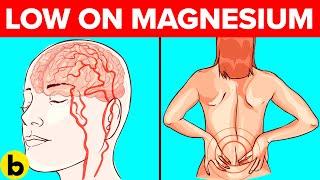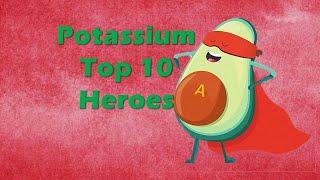Signs And Symptom Of Potassium Deficiency Warning Signs You Are Not Getting Enough Potassium
Description
Potassium is one of the body’s most important minerals. It is present in every cell of the human body.
In fact, it is one of the body’s four main electrolytes, along with sodium, magnesium and calcium.
Being an electrolyte, potassium helps maintain a proper water balance in the body as well as regulate blood pressure.
It also plays a role in the digestion of proteins and carbohydrates.
Here are the top 10 signs and symptoms that you are not getting enough potassium.
1, Muscle Cramps. 01:02
Frequent muscle cramps, whether during the day or night, is a very common sign of a potassium deficiency. Cramping in the legs, feet and arms is common.
Potassium is one of the electrolytes found in all body cells, including muscle and nerve cells.
It works with sodium to maintain your cells’ electrical charges, which control muscle contractions and functioning.
When this mineral is low in the body, the cells do not send or receive the proper electrical signals to control muscle contractions.
This in turn increases the chance of suffering from frequent muscle cramps. The cramps can last from a few seconds to minutes.
As significant fluid loss from profuse sweating may cause low levels of potassium, it is important to replenish your body’s potassium after exercise.
2, Muscle Weakness and Damage. 02:02
A low potassium level can have a huge impact on your muscle health. It can impair the function of muscle cells as well as damage the muscles.
This leads to profound weakness and muscle stiffness, aching and tenderness.
Also, potassium is needed for healing the muscles on a cellular level. Hence, there may also be an increase in muscle tearing or straining with little or no effort.
If your muscles feel weak and tired for no apparent reason, you need to get your potassium level checked.
3, General Fatigue. 02:55
Another common symptom of low potassium is a general feeling of fatigue. This kind of fatigue is not due to overexertion or overworking.
In fact, the feeling of fatigue and tiredness has no explainable reason. Every cell in the body needs the right amount of potassium to function,
and an inadequate amount of this mineral can affect the functioning of cells as well as organs.
Thus, a deficiency of this mineral can lead to fatigue and general weakness.
4, Tingling Sensations. 03:45
Potassium is important for the health of your nerves. A low level of this mineral can affect the electrical impulses that pass from the skin and muscles to the spinal cord and brain.
This can lead to a loss of sensation along the outer extremities, resulting in the tingling sensations.
Usually, this tingling sensation is noticed in the fingers, toes, hands, feet, arms and legs. Low potassium may also contribute to muscle twitching.
If you experience tingling sensations in your arms and legs, along with other symptoms mentioned here,
there is a strong possibility that you are low in potassium. A simple blood test can confirm this.
5, Heart Palpitations. 04:36
A potassium deficiency can also affect your heart health. It can cause an irregular heartbeat rhythm and heart palpitations for no apparent reason at all.
Low potassium can disrupt the rhythmic, coordinated contractions of the heart that are controlled by electrical impulses.
On the other hand, an adequate amount of potassium in the body helps protect your heart from heart disease, heart attacks and strokes.
No matter what, if you are experiencing heart palpitations, it is important to see a doctor.
6, Mental or Emotional Issues. 05:25
Potassium is important for mental health and brain function. It helps maintain the electrical conductivity of the brain and nerve transmissions.
Plus, it plays a key role in transporting serotonin, a neurotransmitter that promotes feelings of well-being and happiness.
This is why a low potassium level can contribute to confusion, mood swings, depression, hallucinations and delirium.
A 1992 article published in Neuropsychobiology reported a relationship between sodium, magnesium and potassium in depressed patients.
7, Constipation. 06:36
The mineral potassium is important for the digestive system, which is made of smooth muscles that contract rhythmically to aid digestion of food.
Low blood levels of potassium can disrupt the functions of the involuntary muscles of the stomach and intestines.
Proper functioning of these muscles is needed for digestion, absorption and metabolism to occur. Poor functioning can lead to constipation.
8, High Blood Pressure. 07:21
Potassium helps relax blood vessels, and without enough of it, they can become constricted, which causes blood pressure to rise.
Potassium also balances out the negative effects of sodium.
When potassium is low, the balance of sodium in the body gets disturbed. This can also affect your blood pressure.





















Comments